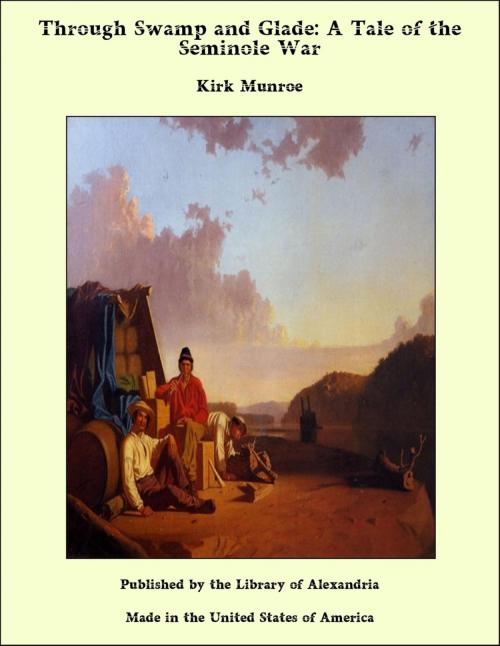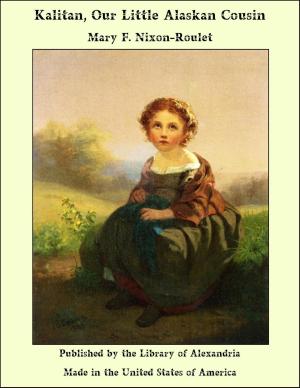Through Swamp and Glade: A Tale of the Seminole War
Nonfiction, Religion & Spirituality, New Age, History, Fiction & Literature| Author: | Kirk Munroe | ISBN: | 9781465624581 |
| Publisher: | Library of Alexandria | Publication: | March 8, 2015 |
| Imprint: | Language: | English |
| Author: | Kirk Munroe |
| ISBN: | 9781465624581 |
| Publisher: | Library of Alexandria |
| Publication: | March 8, 2015 |
| Imprint: | |
| Language: | English |
The scene is laid in Florida, that beautiful land of the far south, in which Ponce de Leon located the fabled Spring of Eternal Youth. It is a land of song and story, of poetry and romance; but one also of bitter memories and shameful deeds. Its very attractiveness has proved its greatest curse, and for weary years its native dwellers, who loved its soil as dearly as they loved their own lives, fought desperately to repel the invaders who sought to drive them from its sunny shores. Although winter is hardly known in Florida, still there, as elsewhere, spring is the fairest and most joyous season of the year, and it is with the evening of a perfect April day that this story opens. The warm air was pleasantly stirred by a breeze that whispered of the boundless sea, and the glowing sun would shortly sink to rest in the placid bosom of the Mexican Gulf. From the forest came sweet scents of yellow jasmine, wild grape, and flowering plumes of the palmetto mingled with richer perfumes from orange blossoms, magnolias, and sweet bays. Gorgeous butterflies hovered on the edge of the hammock and sought resting-places for the night amid the orange leaves. Humming-birds, like living jewels, darted from flower to flower; bees golden with pollen and freighted with honey winged their flight to distant combs. From a ti-ti thicket came the joyous notes of a mocking-bird, who thus unwittingly disclosed the secret of his hidden nest. A bevy of parakeets in green and gold flashed from branch to branch and chattered of their own affairs; while far overhead, flocks of snowy ibis and white curlew streamed along like fleecy clouds from feeding-grounds on the salt marshes of the distant coast to rookeries in the cypress swamps of the crooked Ocklawaha. Some of these drifting bird-clouds were tinted or edged with an exquisite pink, denoting the presence of roseate spoonbills, and the effect of their rapid movement against the deep blue of the heavens, in the flash of the setting sun was indescribably beautiful. Amid this lavish display of nature's daintiest handiwork and in all the widespread landscape of hammock and savanna, trackless pine forest that had never known the woodman's axe, and dimpled lakes of which a score might be counted from a slight elevation, but one human being was visible. A youth just emerged from boyhood stood alone on the edge of a forest where the ground sloped abruptly down to a lakelet of crystal water. He was clad in a loose-fitting tunic or hunting-frock of doeskin girded about the waist by a sash of crimson silk. In this was thrust a knife with a silver-mounted buckhorn handle and encased in a sheath of snakeskin. His hair, black and glossy as the wing of a raven, was bound by a silken kerchief of the same rich color as his sash. The snow-white plume of an egret twined in his hair denoted him to be of rank among his own people. He wore fringed leggings of smoke-tanned deerskin, and moccasins of the same material. The lad's features were handsome and clear cut, but his expression was gentle and thoughtful as might become a student rather than a mere forest rover. And so the lad was a student, though of nature, and a dreamer not yet awakened to the stern realities of life; but that the mysteries of books were unknown to him might be inferred from a glance at his skin. It was of a clear copper color, resembling new bronze; for Coacoochee (little wild cat) belonged to the most southern tribe of North American Indians, the Seminoles of Florida. Indian though he was, he was of noble birth and descended from a long line of chieftains; for he was the eldest son of Philip Emathla (Philip the leader), or "King Philip," as the whites termed him, and would some day be a leader of his tribe.
The scene is laid in Florida, that beautiful land of the far south, in which Ponce de Leon located the fabled Spring of Eternal Youth. It is a land of song and story, of poetry and romance; but one also of bitter memories and shameful deeds. Its very attractiveness has proved its greatest curse, and for weary years its native dwellers, who loved its soil as dearly as they loved their own lives, fought desperately to repel the invaders who sought to drive them from its sunny shores. Although winter is hardly known in Florida, still there, as elsewhere, spring is the fairest and most joyous season of the year, and it is with the evening of a perfect April day that this story opens. The warm air was pleasantly stirred by a breeze that whispered of the boundless sea, and the glowing sun would shortly sink to rest in the placid bosom of the Mexican Gulf. From the forest came sweet scents of yellow jasmine, wild grape, and flowering plumes of the palmetto mingled with richer perfumes from orange blossoms, magnolias, and sweet bays. Gorgeous butterflies hovered on the edge of the hammock and sought resting-places for the night amid the orange leaves. Humming-birds, like living jewels, darted from flower to flower; bees golden with pollen and freighted with honey winged their flight to distant combs. From a ti-ti thicket came the joyous notes of a mocking-bird, who thus unwittingly disclosed the secret of his hidden nest. A bevy of parakeets in green and gold flashed from branch to branch and chattered of their own affairs; while far overhead, flocks of snowy ibis and white curlew streamed along like fleecy clouds from feeding-grounds on the salt marshes of the distant coast to rookeries in the cypress swamps of the crooked Ocklawaha. Some of these drifting bird-clouds were tinted or edged with an exquisite pink, denoting the presence of roseate spoonbills, and the effect of their rapid movement against the deep blue of the heavens, in the flash of the setting sun was indescribably beautiful. Amid this lavish display of nature's daintiest handiwork and in all the widespread landscape of hammock and savanna, trackless pine forest that had never known the woodman's axe, and dimpled lakes of which a score might be counted from a slight elevation, but one human being was visible. A youth just emerged from boyhood stood alone on the edge of a forest where the ground sloped abruptly down to a lakelet of crystal water. He was clad in a loose-fitting tunic or hunting-frock of doeskin girded about the waist by a sash of crimson silk. In this was thrust a knife with a silver-mounted buckhorn handle and encased in a sheath of snakeskin. His hair, black and glossy as the wing of a raven, was bound by a silken kerchief of the same rich color as his sash. The snow-white plume of an egret twined in his hair denoted him to be of rank among his own people. He wore fringed leggings of smoke-tanned deerskin, and moccasins of the same material. The lad's features were handsome and clear cut, but his expression was gentle and thoughtful as might become a student rather than a mere forest rover. And so the lad was a student, though of nature, and a dreamer not yet awakened to the stern realities of life; but that the mysteries of books were unknown to him might be inferred from a glance at his skin. It was of a clear copper color, resembling new bronze; for Coacoochee (little wild cat) belonged to the most southern tribe of North American Indians, the Seminoles of Florida. Indian though he was, he was of noble birth and descended from a long line of chieftains; for he was the eldest son of Philip Emathla (Philip the leader), or "King Philip," as the whites termed him, and would some day be a leader of his tribe.















